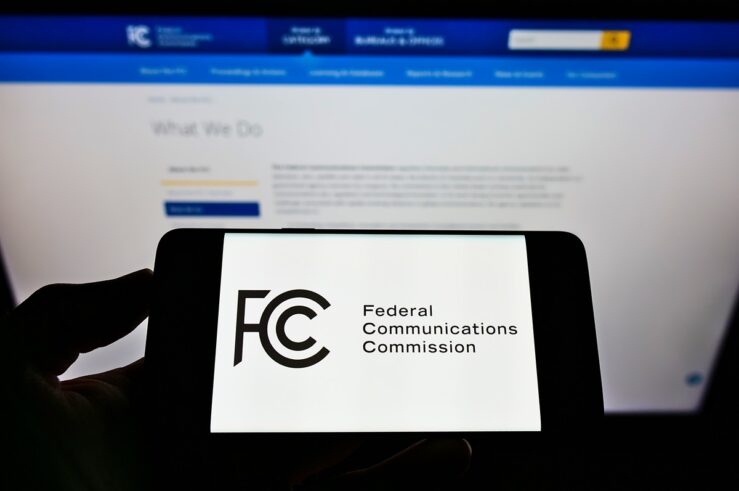
Internet use has soared since the COVID-19 pandemic. Between 2019 and 2022, average monthly data usage increased from 344 GB to 586 GB per month—a 70% increase. In 2019, only 16% of subscribers were on speed tiers of greater than 200 Mbps. By 2023, 74% had such speeds, and a third of subscribers had speeds of 1,000 Mbps or more.
But despite consumers getting much more and much faster internet, the Federal Communications Commission (FCC) seems to think it can regulate the industry into providing even more data at a lower price.
Today, most internet service providers (ISPs) offer hybrid service and pricing plans: a flat rate for an initial data allowance (known as a data cap) and an additional price for data consumed in excess of the initial allowance (known as usage-based pricing or usage-based billing). For example, a plan might offer gigabit speed for $75 a month, and an initial monthly data allowance of 1 TB. Users who exceed the allowance might typically pay $10 for each additional 250 GB of data.
These practices have come under scrutiny, with some advocating for the FCC to ban data caps and regulate usage-based pricing under Title II of the Communications Act. For its part, the FCC took a step in that direction with a recently issued notice of inquiry (NOI) seeking comments regarding “whether data caps cause harm to competition or consumers’ ability to access broadband Internet services.”
If you’re unfamiliar with fedspeak, an NOI is an agency’s way of saying: “We really want to regulate this thing, but we don’t know if we can or how to do it. Give us some ammo and ideas.” Given the FCC’s wording, it’s pretty clear the agency is really itching to ban data caps and, in turn, to regulate usage-based pricing.
This morning, I published a new white paper—together with my International Center for Law & Economics (ICLE) colleagues Kristian Stout and Geoffrey Manne—that we intend to submit as comments to the FCC. In our paper, we argue that, rather than ban or severely restrict data caps and usage-based pricing, the FCC should prioritize a flexible regulatory approach that encourages innovation and investment, while safeguarding consumer interests. This approach should rely on existing antitrust and consumer-protection frameworks to address anticompetitive practices and foster pricing transparency.
The FCC’s Complicated Relationship with Data Caps
As of 2010, the Obama-era FCC still had a somewhat favorable view of data caps, concluding:
[P]rohibiting tiered or usage-based pricing and requiring all subscribers to pay the same amount for broadband service, regardless of the performance or usage of the service, would force lighter end users of the network to subsidize heavier end users. It would also foreclose practices that may appropriately align incentives to encourage efficient use of networks.
In its 2015 Open Internet Order, the agency shifted gears, noting that data caps could “potentially… disadvantage competing over-the-top providers.” A year later, the FCC put the pedal to the metal in its 2016 approval of Charter Communications’ acquisition of Time Warner Cable and Bright House Networks, when the commission prohibited the merged firm from offering data caps or usage-based pricing for its residential broadband service.
Last year, the commission adopted digital-discrimination rules, under which data caps and pricing could be regulated to “prevent[] digital discrimination of access based on income level, race, ethnicity, color, religion, or national origin.” This year, the FCC’s Open Internet Order indicated the commission would evaluate individual data-cap practices on a case-by-case basis under the order’s general-conduct standard. Both of these orders are being challenged in federal court and may not survive judicial scrutiny.
Critiques of Data Caps and Usage-Based Pricing
Criticisms of data caps—many of which are highlighted in the FCC’s NOI and consumer complaints solicited by the FCC—tend to claim that data caps are arbitrary and that they burden consumers, particularly those who rely heavily on internet access for work, education, or healthcare. Some consumers have also expressed frustration with the complexity of monitoring data usage and the potential for unexpected overage charges.
The FCC’s NOI also questions the effectiveness of data caps as a congestion-management tool, pointing to the fact that many ISPs suspended data caps during the COVID-19 pandemic without significant network disruption. Critics further argue that data caps stifle innovation and competition by discouraging the development and adoption of data-intensive applications and services. They contend that the true motive behind data caps is profit maximization, not network management, especially given that ISPs charge allegedly hefty fees for exceeding data limits.
Data Caps as an Economic Tool
Daniel Lyons of Boston College draws an analogy between airlines and ISPs to illustrate the economic rationale behind data caps. Airlines—which, like broadband providers, operate with large fixed costs—employ a tiered pricing system under which fares vary based on passengers’ willingness to pay (e.g., first class, business class, coach). This approach allows them to maximize revenue, while still ensuring full capacity utilization. Similarly, data caps enable ISPs to implement a form of price discrimination, charging heavy data users more while offering lower prices to lighter users.
Under flat-rate pricing, which the current FCC majority appears to prefer, all consumers pay the same amount regardless of their usage. In practice, this means light users will tend to subsidize the data consumed by heavy users. As such, users with relatively low data demands may find broadband unaffordable under a flat-rate pricing plan, and therefore remain unconnected.
By contrast, usage-based strategies allow for more granular pricing that better reflects individual consumption patterns. This can lead to lower prices for entry-level plans—increasing broadband adoption and, in turn, provider revenues. Moreover, such pricing provides better recovery for the costs associated with serving heavy users.
This model promotes economic efficiency by aligning prices with consumption patterns. It allows ISPs to recover the significant costs of building and maintaining broadband infrastructure, potentially funding network expansion and upgrades. Furthermore, usage-based pricing may discourage overuse or undervalued uses, such as streaming a 4K movie to an empty room.
While heavy users may be worse off under usage-based pricing, consumers overall are better off: prices are more closely aligned to willingness-to-pay, the ISPs cover their costs, and more consumers are connected to the internet.
A Balanced Approach Using Existing Law
A policy framework that emphasizes transparency and informed consumer choice can address both consumer confusion and annoyance about data caps and usage-based pricing.
Current regulations, such as broadband “nutrition labels,” require ISPs to clearly disclose their data cap and usage-based pricing policies, thereby empowering consumers to make informed decisions. Existing consumer-protection and antitrust laws, in addition to the FCC’s existing authority, are already in place to address any anticompetitive or deceptive practices on a case-by-case basis.
The timing of the FCC’s renewed interest in data caps and usage-based pricing is quixotic. FCC Chair Jessica Rosenworcel first dropped hints of an inquiry more than a year ago, then went silent on the topic. It’s odd that the commission would release an NOI in the waning days of the current presidential administration, when there is a good chance that the commission’s current makeup may be very different next year, regardless of who is in the White House.




